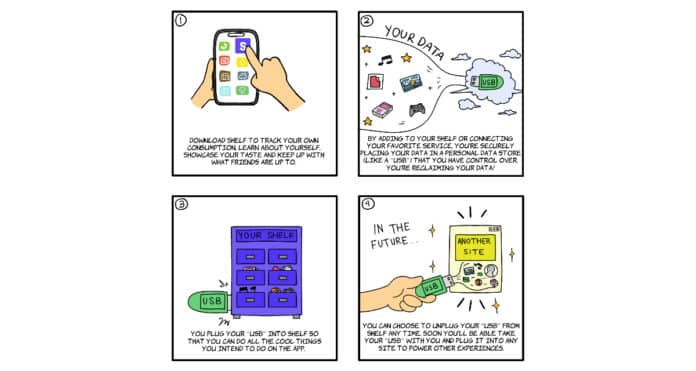Social networks have become increasingly homogenous, showing everything from text to short videos across platforms, where algorithms often overshadow your creativity. In this ubiquitous environment, it’s harder than ever to get a genuine sense of someone’s vibe before deciding to follow them.
Enter Shelf, an app that lets you create a personalized “storefront” of your media habits, then connect with others based on the movies, shows, books, games, and music they consume. It also lets you track progress while reading your favorite book or watching a trending show.
“If you observe culture at large on the internet, it’s shifting away from posting selfies to here’s what I’m reading, watching, screenshots of the reviews of my movies and so on. It’s essentially going deeper about a person, trying to understand what they’re in … that’s what Shelf is all about,” said Jad Esber, co-founder and CEO of Koodos Labs, the startup behind Shelf, in an interview.
Esber grew up writing online poetry anonymously, then spent the early years of his career at YouTube in London from 2015 to 2018. During this time, he worked on the creator side of the Google subsidiary, helping people create content, grow their audience, and monetize their work. This was when YouTube grew its creator ecosystem in various emerging markets outside the U.S.
After spending over three years at Google, the Cambridge University master’s graduate returned to academia, joining Harvard University to research consumer internet trends and study the internet academically. That eventually helped him conceptualize Shelf in a market full of social media apps with millions and billions of users.
“We built many, many products,” Esber told TechCrunch. “They all didn’t work until Shelf, and Shelf emerged from those learnings.”
How does it work?
The Shelf app, available on iOS and Android, lets you connect your accounts associated with media, including Apple Music, Goodreads, Netflix, Spotify, and YouTube, then builds a customizable “storefront” web page that updates automatically based on your consumption progress. You can also manually add links to any other internet service to your virtual shelf — even links to your favorite TechCrunch articles, which you can showcase to your followers.
The New York-based startup also plans to expand the list of supported services, including Steam for gamers.
“[A]s humans and as people online, we’re very multi-hyphenate. We’re not just into music, movies, shows, and all these things. Adding support for certain categories will expand the user base, but at the same time deepens the use case for existing users,” Esber said.
You can choose a URL for the digital shelf based on your preference. Likewise, the app lets you customize the interface by changing the background color and moving items depending on your taste.
Koodos plans to monetize Shelf by offering new customization options. It could also explore monetizing insights that the app surfaces, Esber told TechCrunch.
Unlike apps that call the data using APIs, Shelf works regardless of whether the platform has a first-party API. Generally, when users select a third-party service like Spotify or Apple Music from the Shelf UI, they’re signed in (either via a redirect to that app, or via a pop-up screen). Once the user has signed in, Esber can pull all the information about that user’s media consumption directly from the app.
Esber also stated that the startup does not use the data Shelf gets from the services users list on the app to train AI, which has become a common practice among online platforms nowadays.
This data-sharing is powered by a technology called DataMovers, and Koodos has been working with other apps to expand this solution as well (although Esber wouldn’t say which ones). He compares DataMover with the data transfer network for fintech Plaid.
“In a similar way [to Plaid], we’re affording that user provision access to data to other applications, too,” he said.

Private experience in testing
Alongside letting users create their storefronts for the public, Shelf has begun testing a private experience for some users, who only want to track their own media consumption without sharing it.
“We intend to be a fun utility that anyone can use over time. Everyone has a bookshelf in their living room or at home. So, why can’t everyone have the Shelf?” Esber said.
Launched publicly this summer after its beta testing at the end of last year, Shelf has added half a billion items by its users. Esber declined to share user numbers but said the number of shelves on the app is growing by 40% month-to-month and that users visit Shelf an average of five times a week to check in on or update their digital shelves or keep up with others’ shelves.
Koodos has raised $7 million in total from investors, including First Round Capital, M13, Blockchain Capital, and IDEO, as well as the founders of companies, including Zynga and VSCO. It also counts Pinterest co-founder Evan Sharp, Dubsmash co-founder (now Reddit VP) Suchit Dash, and the pioneers of market design at Harvard, Professors John Deighton and Scott Kominers.










![Best Weight Loss Supplements [2022-23] New Reports!](https://technologytangle.com/wp-content/uploads/2022/12/p1-1170962-1670840878.png)




